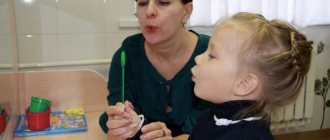Speech therapy for everyone
1. Primary prevention
A. Prevention before birth
Let us follow step by step (as if in the course of the child’s development) the main content of this type of prevention.
Since much in a child’s development can be determined by heredity, future parents need to approach this issue very seriously. If there is particularly unfavorable heredity on the maternal or paternal side, it is necessary to seek advice from specialists, and then carefully weigh the pros and cons. As life shows, in some cases it is better to completely abandon the intention to have a child than to doom him to severe disability.
As for the health of the future parents themselves, it is very important to prevent a thoughtless attitude to life and the acquisition of various kinds of bad habits, which have already been mentioned when considering the causes of speech disorders. If such habits have already been acquired, then both future parents need to completely abandon them at least a year before pregnancy.
Even such, as many believe, a “harmless” thing like maternal smoking during pregnancy has a negative impact on the entire course of intrauterine (and therefore subsequent) development of the child, as was also mentioned above. I have repeatedly encountered very severe cases of speech and other pathologies in children born to fathers who, some time before the birth of the child, were directly involved in the liquidation of the Chernobyl accident. This also applies to many other hazardous occupational conditions.
The period of pregnancy requires special attention in terms of preventing speech disorders. Great concern for ensuring the normal course of this most important period in a woman’s life is manifested on a national scale - through a network of antenatal clinics, where explanatory and preventive work is systematically carried out with expectant mothers. However, a lot depends directly on the woman herself, on her compliance with the necessary personal precautions. To make it clear what we are talking about, we will give only one specific example.
One of our young employees was going on maternity leave, and her pregnancy was going extremely well. She was really expecting a child, everything was fine in the family and, it would seem, nothing foreshadowed trouble. When we said goodbye to her, we all asked her to be as careful as possible. But since she felt quite normal, when she went on maternity leave, she decided to start general cleaning in the apartment on the very first day: wash all the curtains, which she herself removed from the high windows, etc. At the end of the third “working” day, an ambulance brought she was taken to the hospital, where she gave birth to a seven-month-old child with serious complications. And then he developed a long “tail” of not only speech, but also various neuropsychic pathologies...
This is the high price you often have to pay for your rash actions. Therefore, it is so important to understand that even the best health during pregnancy can be deceiving and that extreme caution must be exercised throughout this period.
Various kinds of stressful situations that arise in the family have a very negative impact on the unborn child, especially if they become protracted. Therefore, all family members should be well aware of the importance of the moment and the need to create as calm an environment as possible in the house. Resolution of all kinds of conflicts should be postponed not only during pregnancy, but also for the entire postpartum period. There are no everyday problems that would be more important than the neuropsychic health of the unborn child and the usefulness of his speech - this is ultimately always realized by all parents, but often such awareness comes too late...
As for various types of accidents, many of which are not in our power to prevent, here too the reasonableness of the behavior of the woman herself and her closest relatives and friends is very important. After all, we all know well that any misfortune can be experienced in different ways: mentally, as if smoothing it out (it has already happened anyway and nothing can be changed), or, on the contrary, aggravating it, “winding it up.” It is important to understand that the latter in this case is completely unacceptable and that, if possible, the most gentle conditions should be created for the expectant mother - she should be tried in every possible way to somehow be eliminated from direct participation in undesirable events and reassured as much as possible.
The process of childbirth itself also largely depends on the woman herself. Reasonable and correct behavior of the expectant mother during pregnancy largely determines the normal course of childbirth. In the immediate period before giving birth, it is necessary to completely exclude supposedly urgent travel and flights to other cities, since cases of labor starting directly on a train or plane are not so rare. There is hardly any need to explain what an unimaginable risk this entails not only for the unborn child, but also for the mother herself. Often you will regret such a trip for the rest of your life. As for a woman’s behavior directly during childbirth, it is very important for her to acquire all the necessary information about this in advance. Fortunately, the necessary work in this regard is carried out by antenatal clinics; you just need to take this with full responsibility.
B. Prevention after birth
After the birth of a child, one should very carefully monitor the course of its early development, noting any lag in this development or deviation from its normal course. So, if a child does not begin to hold his head up or sit up independently in due time, if he is delayed in starting to walk or in appearing his first words and phrasal speech, then the reasons for these delays must be promptly clarified from specialists and the measures they recommend to correct the situation must be immediately taken. In this regard, the following general rule usually applies: the less time the lag from the norm continues, the easier it is to overcome it.
As for the prevention of speech disorders directly, it consists mainly of the following two points:
1) care for the physical and neuropsychic health of the child and the safety of his speech organs;
2) concerns about the correct speech development of the child, including the creation of the social and living conditions necessary for this.
The solution to the first of these problems is specifically expressed in the following:
• prevention of bruises in the head area;
• prevention of various diseases and childhood infections that occur with high fever (compliance with the timing of preventive vaccinations, exclusion of direct contact with patients, etc.);
• protection of the hearing organs from colds, from foreign bodies, from excessive noise (even during sleep), as well as timely treatment and mandatory follow-up treatment for ear diseases;
• protection of articulatory organs, consisting of the following:
- prevention (and treatment) of rickets and the possible appearance of anomalies of the bone parts of the speech apparatus;
- eliminating cases of thumb sucking or constantly placing your hand under the same cheek during sleep (the latter can lead to the formation of a so-called crossbite);
— early dental prosthetics in case of their premature loss, since tooth loss in children causes significant deformation of adjacent teeth and jaws (here we do not mean age-related change of teeth);
— timely surgery for clefts of the upper lip and palate, if the child has them;
- timely trimming of the short frenulum of the tongue (no later than 4–5 years, since by this time those sounds should appear in speech, the correct articulation of which is prevented by the short frenulum);
• protecting the vocal apparatus from colds, dust, vocal overload (excessive screaming, excessively loud and intense speech, etc.);
• protecting the child’s nervous system (excluding loud shouts, scary stories and all kinds of intimidation, a gentle approach to the child during any illness and for some time after its end, fighting roundworms, etc.); This section of prevention is especially important for the prevention of all kinds of neurotic speech disorders and, first of all, stuttering.
Concern for the correct speech development of the child should be expressed in the following:
• providing a favorable speech environment as a necessary role model (in terms of the absence of speech disorders in people around the child);
• encouraging the baby's babbling with facial expressions of joy;
• fostering a focus on perceiving the speech of others, for which you need to talk to the child as much as possible, starting from the first days of his life;
• slow and clear pronunciation by adults of simple words related to a specific life situation for the child, as well as clear naming of surrounding objects and actions performed, which will help the child gradually begin to master speech;
• clear, correct pronunciation by adults of words incorrectly said by the child, designed for unobtrusive and gradual correction of his incorrect pronunciation;
• teaching the child to look at the interlocutor’s face during a conversation, since visual perception of articulation contributes to its more accurate and faster assimilation;
• systematically creating situations in which the child must express his request verbally (adults should not strive to understand him at a glance, much less with just one gesture or glance); it is necessary to organize the child’s life in such a way that the environment itself causes him the need for verbal communication, including “talking” with animals, toys, etc.;
• complete elimination of cases of cooing with a child, depriving him of a correct role model;
• rhythmic, music and singing classes; the latter promotes the development of proper breathing and a fairly flexible and strong voice, and also prevents slurred speech; • development of fine manual motor skills, which plays an extremely important role in mastering full speech.
Main directions of prevention of speech disorders
Abstract: This article reveals theoretical issues on the types of prevention of speech disorders according to L.S. Volkova. Primary prevention addresses issues of genetic counseling, the importance of stimulating speech development, as well as the issue of adaptation. Secondary prevention reveals the concepts: primary-secondary disorders, sensitive period, compensatory mechanisms and corrective measures. Tertiary prevention explains the issues of labor socialization of persons with speech disorders.
Main directions of prevention of speech disorders
Protecting public health is one of the most important functions of the state. Preventive focus in preserving health and nurturing a harmoniously developed personality is the main content of humanism. The synthesis of hygienic, educational and corrective measures is designed to ensure the development of the physical and spiritual strength of the younger generation.
Solving these problems is inextricably linked with prevention and timely detection of deviations in the physical, neuropsychic and speech development of children.
At the same time, one of the most important areas of speech therapy assistance in preschool educational institutions is the prevention of speech disorders and the compensatory mechanism of secondary and tertiary disorders of various pathologies, including speech.
For this industry, speech therapy as a science poses the following tasks :
1. Primary prevention consists precisely in the prevention of speech disorders.
2. Secondary prevention, deals with preventing the transition of speech disorders to chronic forms, and also preventing the consequences of speech pathology.
3. Tertiary prevention, carries out social and labor adaptation of persons suffering from speech disorders.
Primary prevention.
In speech development, the prevention of disorders is primarily based on measures of pedagogical, social and, above all, psychological prevention of disorders of higher mental functions.
The younger generation suffers from reduced immunity, disorders of the nervous and endocrine systems, which depend mainly on the environment. A polluted environment causes acute and chronic diseases, as well as a decrease in the body's resistance to harmful influences. Parents also show a decrease in the quality of all aspects of health; it has been revealed that with a family history, children more often suffer from the same disorders as their parents.
Psychoprophylactic measures include timely genetic counseling of future parents.
Genetic counseling includes: identifying disorders at the genetic level and clarifying their consequences; determining the severity of the disease and the risk of relapse; a detailed description of methods of prevention and timely, optimal correction.
Relevant in primary prevention is the education of young parents, who are responsible for the neuropsychic health of the child. Parents, together with doctors, carefully monitor the development and formation of all physiological reactions, and in case of deviations from the norm, they must take the necessary preventive measures.
For the full development of a child, stimulation of the formation of speech function is of particular importance. It is necessary to promote the child’s favorable acquisition of motor skills (sitting, crawling, walking, fine and gross motor skills, etc.), and especially the speech motor apparatus. The development of fine motor skills of the hands, especially manipulative activities, is closely related to the formation of speech motor function.
In the first years of life, the development of speech understanding, that is, the development of a passive vocabulary, which in turn depends on the speech behavior of adults, is of particular importance for the child. The child begins to understand speech by establishing connections between the words that adults pronounce and the objects that these words denote.
In the initial period of speech development, one should not overload the child with mastering obscure words with difficult pronunciation, or memorizing songs and poems that belong to the older age category.
People surrounding the child, with their calm speech, clear and smooth articulation, and grammatically correct phrases, encourage the child to imitate the appropriate design of the speech function.
The process of mastering correct sound pronunciation is disrupted when the adults surrounding the child have incorrect pronunciation, or, while having fun, repeat an incorrectly formulated speech utterance, the impaired sound pronunciation is fixed and in the future the child needs special speech therapy training.
The development of speech skills is carried out together with the environment. Correct perception of objects, accumulation of knowledge and skills about them occurs due to the close interaction of sensory and speech development.
The leading type of activity in preschool age is children's play, through which the needs of cognition and the need to acquire knowledge and skills appropriate to their age are motivated. Incorporating didactic games into a child’s life promotes sensory development, develops learning ability, and improves phonemic hearing and speech in general.
Differentiated classes in auditory and phonemic perception are necessary for a child to successfully master reading and writing. With full and high-quality learning in reading and writing, important skills for a child are the ability not only to hear individual sounds in a word, but also to understand that there is a certain sequence of sounds in a word. The ability to differentiate and separate sounds leads to the development of auditory memory and attention to the very sound side of speech.
Great responsibility for carrying out preventive measures for neuropsychic disorders leading to various disorders, including speech disorders, rests with preschool institutions. The programs of the federal state educational standard outline the tasks that organize the educational activities of a preschool institution in the field of mental, moral, physical and aesthetic development of a preschool child.
It should be noted that an important psychological aspect of high-quality prevention of neuropsychic disorders, speech in particular, is the timely referral of the child to a preschool institution, precisely in the age period in which adaptation to new living conditions will be most painless.
Adaptation to the conditions of being separated from the family reveals the child’s cognitive mechanisms, develops interest in new objects and people, and activates the child’s active activity. An important condition for this period is compliance with hygiene rules, in which the development of physical activity in children is important, both in kindergarten and at home.
Secondary prevention.
It is known that there is a relationship between speech disorders (primary disorders) and the mental development of the child, the formation of his personality and behavior (secondary disorders).
Speech disorders caused by organic brain lesions (alalia, aphasia) completely limit mental development. This happens both due to the functional unity of speech and thinking, and disruptions in interaction with the outside world. The latter significantly impoverishes both knowledge and emotions, and the mental manifestations of the personality completely.
The interaction of social and biological factors plays a special role in speech ontogenesis, so it is important to involve the child’s parents in the correctional work as much as possible. They should be aware that a low level of development of the sucking reflex, low motor activity, and a weak or strong voice indicate brain damage.
Existing views in society on the prognosis and incurability of organic brain lesions significantly influence the attitude of parents towards their child. It is important for the speech therapist to explain to parents the compensatory mechanisms of the existing organic defect, to pay attention to the significance of congenital reflexes (echopraxia and echolalia), to the evocation of the child’s vocal reactions and the first stages of babbling for the development of motor activity of the articulatory apparatus. Parents should be well aware that the earlier correctional work is started, the less the child’s intellectual and speech development will suffer.
Speech disorders in children are often combined with an insufficiently formed and developed holistic image of the subject. Therefore, it is important to carry out correction work in such a way that first the image is clarified or created, which during further work is clarified with words (the second signal system). Corrective work is aimed at overcoming both speech and non-speech symptoms, taking into account the individual psychological development of the child. The nature of speech impairment and its degree, manifestations of secondary mental disorders determine the child’s ability to learn and the possibility of an active social position.
The timely formation of prerequisites for mastering practical skills of analysis and synthesis is hampered by underdevelopment of the sound side of speech, immaturity of phonemic processes and sound pronunciation. This phenomenon is considered as the first consequence leading to difficulties in mastering literacy. Second-order consequences include those difficulties that arise directly in the process of mastering literacy.
The maximum concentration of the teacher-speech therapist should be aimed at the timely prevention of secondary deviations, consequences remote from the speech pathology itself. One should also focus on preventing secondary deviations when analyzing the state of the sound aspect of speech, since deficiencies in mastering writing and reading skills are caused by the immaturity of phonemic processes, even with full compensation of sound pronunciation defects.
The speech therapist needs to know and take into account all the manifestations of a certain speech pathology, and especially the conditions for full compensation. Therefore, a comprehensive comprehensive study of each child is of particular importance for the construction of optimal correctional education and upbringing of a child with speech pathology and the prevention of secondary deviations.
Provided comprehensive knowledge about the development of the child (psychological, speech, physical) based on the norms of child development, speech therapy prevention can be effective. This fact will enable the speech therapist to direct the process of education and training, relying on periods of increased sensitivity (sensitivity) that manifest themselves at certain stages of ontogenesis. Corrective training that is untimely (advanced or delayed) to the period of sensitivity is less effective, although reliance on the patterns of development of the psyche and speech, psychophysiological characteristics allows the speech therapist to achieve positive progressive results.
Tertiary prevention. Speech defects limit the choice of professions. The tasks of tertiary prevention include vocational guidance and training for people with speech pathology.
The main direction of this stage is considered to be a deep consideration of the individual capabilities and interests of each child with speech disorders. Such children need the opportunity to choose, with the help of specialists such as a teacher, doctor, psychologist, a learning path in which the child will achieve the best results. For this category of children, it is important to shift the center of gravity from cognitive to emotional and social development.
The main goal of labor education of children with speech disorders is to develop the belief that work is the main form of personal fulfillment.
The speech environment has a decisive and mainly dominant role in the prevention of speech disorders in childhood. The very prevention of speech disorders begins precisely at the age when speech itself begins, that is, in infancy, if necessary. It is important to take into account the actual ontogenesis of speech (the gradual individual development of the child in general, and speech in particular), and its main components.
Work on the prevention of speech disorders can be divided into carrying out psychohygienic activities and preventing speech defects using special techniques and means. During the period of intensive speech development, extreme vulnerability and sensitivity to external negative influences are noted.
Based on this fact, preventive activities necessarily include: protecting the neuropsychic and physical health of children; implementation of friendly, calm life of children, prevention of stressful situations in the external environment; identifying risk factors in speech development at an early stage, monitoring the presence of deviations from the norm in a healthy state, the presence of congenital or acquired diseases that affect the child’s speech development.
Timely and competent prevention of speech development is necessary for the early prevention of speech disorders, since delayed speech development complicates relationships with others, and subsequently has a detrimental effect on the process of learning to read and write, and other mental functions.
Sokolova K.M., teacher-speech therapist
- The main directions of preparing for writing older preschoolers with general speech underdevelopment
- Speech therapy massage in the correction of complex speech disorders
- The role of parents in correctional work to correct speech disorders
- Application of Su-Jok therapy in the correction of speech disorders in children
- Methodological recommendations for teachers “Logorhythmics as a means of correcting speech and non-speech disorders”
( 1 liked, average score: 5.00 out of 5)
Loading...
Recently, the issues of providing specialized speech therapy assistance to preschool children have become relevant in preschool education. Statistics show that there is currently an increase in the number of children with speech defects. In this regard, there is an increasing need for speech therapists and teachers of non-special type preschool institutions to work together to prevent speech disorders in preschool children. Speech therapy work in a non-special type preschool institution includes several areas: overcoming existing speech disorders in children, preventing possible secondary speech disorders, preventing speech disorders before they occur, improving various aspects and qualities of speech in the absence of disorders, parallel correction and development of other mental functions such as auditory and verbal attention, visual and verbal memory, logical thinking. One of the most important areas is the prevention and prevention of speech disorders in preschool children.
What are the causes of speech disorders ?
1) deterioration of the environmental situation; 2) an increase in the number of pregnancy pathologies; 3) increase in the number of birth injuries; 4) weakening of children’s health and increase in childhood morbidity; 5) various social reasons.
I would like to dwell separately on the social causes of speech disorders. First of all, it should be noted that the level of linguistic culture of society as a whole has decreased. Our children often hear around them not only incorrectly formed speech, but also far from literary expressions. In some cases, the content and speech design of television programs leaves much to be desired. Improper speech environment and upbringing can also cause speech defects in children (type of distortion). In this state of affairs, a small child is not able to perceive the linguistic norm of his native language, the articulatory structures of the sounds of audible speech, and he develops an incorrect or inaccurate perception of speech sounds. And this, in turn, leads to the appearance of sound pronunciation defects.
Disturbances in the sound culture of speech that arose in preschool age can later affect a number of secondary speech disorders: underdevelopment of phonemic hearing, delayed formation of skills in syllabic and sound-letter analysis of words, violation of the grammatical structure of speech, and a decrease in vocabulary. Any speech disorder can affect the child’s activity and behavior as a whole. Therefore, it is so important to take care of the timely development of children’s speech and pay attention to its purity and correctness. According to many experts, the beginning of targeted work on the formation of correct sound pronunciation from the age of three helps prevent the appearance of many speech disorders, and often identify other, more complex speech pathologies in children of this age, which contributes to their early correction. In kindergarten, various games are widely used to develop auditory attention in children, and finger games are used to develop fine motor skills of the fingers. Clarifying the articulation and pronunciation of sound is very important in the process of working on speech development. It allows you to attract children's attention to the position of the organs of articulation and enhance kinesthetic and auditory sensations. Children should have basic knowledge about the structure of the oral cavity and the possible movements of the organs of articulation. In accordance with the education and training program in kindergarten, children are introduced to speech sounds in a certain sequence, repeating the main stages of the formation of children's speech during normal speech development. In this regard, it is very important to familiarize children with speech sounds by performing articulation training exercises that contribute to the formation and consolidation of correct pronunciation skills. To achieve the desired result, it is necessary to perform the appropriate complex of articulatory gymnastics in a group. Consistent, systematic work on the development of auditory attention, the development of articulatory and fine motor skills in children, and the refinement of articulation and pronunciation of sounds creates favorable conditions for the normal development of the sound side of speech in preschool children. The period of pregnancy requires special attention in terms of preventing speech disorders. Great concern for ensuring the normal course of this most important period in a woman’s life appears on a national scale - through a network of antenatal clinics, where explanatory and preventive work is systematically carried out with expectant mothers. However, a lot depends directly on the woman herself, on her compliance with the necessary personal precautions. Various types of stressful situations that arise in the family also have a very negative impact on the unborn child. Therefore, all family members should be well aware of the importance of the moment and the need to create as calm an environment as possible in the house. After the birth of a child, one should very carefully monitor the course of its early development, noting any lag in this development or deviation from its normal course. So, if a child does not begin to hold his head up or sit up on his own at the right time, if he is delayed in starting to walk or in the appearance of his first words and phrase speech, then the reasons for these delays must be promptly clarified by specialists and the measures they recommend to level the position must be immediately taken. In this regard, the following general rule usually applies: the less time the lag from the norm continues, the easier it is to overcome it.
As for the prevention of speech disorders directly at an early age, it consists mainly of the following two points:
1. Caring for the physical and neuropsychic health of the child and the safety of his speech organs;
- prevention of head bruises; — prevention of various diseases and childhood infections that occur with high fever (compliance with the timing of preventive vaccinations, exclusion of direct contact with patients, etc.); - protection of the hearing organ from colds, from foreign bodies, from excessive noise (even during sleep), as well as timely treatment and mandatory “follow-up treatment” for ear diseases; - protection of articulatory organs, consisting of the following: - prevention and treatment of rickets and the possible appearance of bone anomalies of the speech apparatus; - eliminating cases of thumb sucking or constantly placing your hand under your cheek during sleep (the latter can lead to the formation of a so-called crossbite); — early dental prosthetics in case of their premature loss, since tooth loss in children causes significant deformation of adjacent teeth and jaws (here we do not mean age-related change of teeth); — timely surgery for clefts of the upper lip and palate, if the child has them; - timely trimming of the short frenulum of the tongue (no later than 4-5 years, since by this time those sounds should appear in speech, the correct articulation of which is prevented by the short frenulum); — protection of the vocal apparatus from colds, dust, vocal overload (excessive screaming, excessively loud and intense speech, etc.); - protection of the child’s nervous system (exclusion of loud shouts, scary stories and all kinds of intimidation, a gentle approach to the child during any illness and for some time after its end) - this type of prevention is especially important for preventing all kinds of neurotic speech disorders and, in the first place, turn - stuttering.
2. Concern for the correct speech development of the child should be expressed in the following:
- ensuring a favorable speech environment as a necessary role model (in terms of the absence of speech disorders in people around the child); - encouraging the child’s babbling with facial expressions of joy; - fostering an orientation towards the perception of the speech of others, for which you need to talk to the child as much as possible, starting from the first days of his life; - adults slowly and clearly pronounce simple words related to a specific life situation for the child, as well as clearly naming surrounding objects and actions performed, which will help the child gradually “begin” mastering speech; — a clear pronunciation by adults of words incorrectly spoken by the child, designed to unobtrusively and gradually correct his incorrect pronunciation; — teaching a child to look at the interlocutor’s face during a conversation, since visual perception of articulation contributes to its more accurate and faster assimilation; - systematically creating situations in which the child must express his request verbally (adults should not strive to “understand him at a glance,” and especially with just one gesture or glance); - it is necessary to organize the child’s life in such a way that the situation itself causes him to need speech, including “talking” with animals, toys, etc.; - complete exclusion of cases of “lisping” with a child, depriving him of the right role model; - practice rhythmics, music and singing: the latter promotes the development of proper breathing and a fairly flexible and strong voice, and also prevents slurred speech; -development of fine manual motor skills, which plays an extremely important role in mastering full speech.
Thus, the teaching staff of the kindergarten and parents must monitor the child’s speech, develop his fine motor skills, auditory memory and other mental processes associated with speech, and also speak correctly and beautifully themselves.
Group of organic causes
Intrauterine pathology leading to impaired fetal development.
The most vulnerable period of exposure to negative factors on the fetus is the first third of pregnancy. The influence of a harmful factor or their combination during this period can lead to underdevelopment or damage to the child’s central nervous system, including the speech zones of the cerebral cortex. These factors include:
- Intrauterine fetal hypoxia (oxygen starvation), the causes of which can be different - gestosis (toxicosis) in the first and second half of pregnancy, nephropathy, threat of miscarriage, pathology of the placenta, increased blood pressure, somatic (general) diseases of the mother (diabetes mellitus, nephritis, heart disease -vascular system).
- Viral diseases suffered by the mother during pregnancy (rubella, influenza, scarlet fever, measles, infectious hepatitis, tuberculosis, polio, toxoplasmosis, herpes, syphilis, HIV infection). The diseases that cause the greatest harm to the fetus include, first of all, rubella. Rubella disease in the first months of pregnancy can cause severe malformations of the child (deafness, blindness, mental retardation, cardiovascular system defects). Cytomegalovirus has a dangerous damaging effect on the fetus. Infection with this virus in the early stages of pregnancy leads to the death of the embryo and spontaneous abortion. If pregnancy continues, cytomegalovirus causes fetal developmental abnormalities. Infection with viral hepatitis also poses a great danger to the fetus, since it can cause various fetal abnormalities at all stages of pregnancy.
- Injuries, falls and bruises of the mother . Especially if the bruise was in the abdominal area. Can lead to placental abruption and premature birth.
- Incompatibility of blood between mother and fetus . Penetrating through the placenta, antibodies cause the breakdown of fetal red blood cells and the release of a toxic substance - indirect bilirubin. Its action affects parts of the brain, which leads to congenital pathologies of hearing and speech.
- Violations of the terms of gestation - prematurity (less than 38 weeks) and postmaturity (more than 40 weeks).
- Smoking, drinking alcohol and taking drugs . Nicotine, being the main toxic component of tobacco smoke, has a negative effect on blood circulation in the uterus and placenta. Under its influence, the processes of active transport of amino acids from mother to fetus are inhibited. As a result, the processes associated with the increase in fetal weight are disrupted (the lag in body weight during full-term pregnancy can reach 300 grams or more, and the body weight deficit persists during the first year of the child’s life). In addition, children whose mothers continued to smoke heavily during pregnancy (more than 20 cigarettes per day) may subsequently be characterized as hyperactive and disinhibited, and often experience more difficulties in school. Alcohol and drugs have a negative impact on the development of the fetus, as well as the mental and physical development of the newborn. When a mother abuses alcohol and drugs, a syndrome may occur characterized by multiple anomalies of fetal development and disturbances in the physical and mental development of the child: disorders of the central nervous system (hyperexcitability, incoordination of movements, decreased intelligence), slowed growth, abnormalities of the facial skull (elongation of the face, low forehead, underdevelopment of the chin, ears, strabismus), as well as anomalies of internal organs and limbs.
- Taking medications. There are medications that are contraindicated during pregnancy or should be used with caution. These include: Anticancer antibiotics (actinomycin, sarcolysin). When consumed in the early stages of pregnancy, they lead to deformities in the fetus.
- Ototoxic drugs - antibiotics - streptomycin, monomycin, kanamycin, gentamicin, amikacin, tobramycin; diuretics - furosemide; and also - aspirin, quinine, which cause dystrophy of the auditory nerve with the development of congenital deafness.
- Indirect anticoagulants (dicoumarin, pelentan), quickly penetrating the placenta, can cause hemorrhages in the fetus in the soft meninges and internal organs.
- Prescribing antidepressant drugs (imizin, amitriptyline) and tranquilizers (sibazon, meprotan) in the early stages of pregnancy leads to fetal intoxication.
Hereditary predisposition, genetic abnormalities
The structural features of the speech apparatus can be inherited. For example, improper fit and set of teeth, bite shape, predisposition to defects in the structure of the hard and soft palate (cleft palate), as well as features of the development of speech areas of the brain. A hereditary predisposition to stuttering has been identified.
In a family where one of the parents started speaking late, similar problems may arise in the child. Researchers attach varying importance to the hereditary nature of speech disorders - from minimal to very large. This is due to examples of the fact that speech disorders are not always inherited from parents to children. However, this circumstance cannot be excluded.
Dangers of childbirth
- Birth injuries leading to intracranial hemorrhages. The causes of birth injuries can be different - the mother’s narrow pelvis, mechanical stimulation used during pregnancy (application of forceps to the baby’s head, squeezing out the fetus). Intracranial hemorrhages caused by these circumstances can affect the speech areas of the brain.
- Asphyxia is a lack of oxygen supply to the brain due to breathing problems, for example, when the umbilical cord is entangled. Causes minimal organic damage to the brain.
- Low body weight of the newborn (less than 1500 grams) and subsequent intensive resuscitation measures (for example, artificial ventilation lasting more than 5 days).
- Low Apgar score (a generally accepted method for assessing the condition of a newborn immediately after birth).
Diseases suffered by a child in the first years of life
At an early age, the following circumstances are unfavorable for speech development:
- Infectious viral diseases, neuroinfections (meningoencephalitis, meningitis), leading to damage to the central nervous system, decreased or loss of hearing.
- Injuries and bruises of the brain, in severe cases leading to intracranial hemorrhages, impaired speech development or loss of existing speech. The type and severity of the speech disorder will depend on the location (focus) of the brain damage.
- Injuries of the facial skeleton leading to damage to the peripheral part of the speech apparatus (perforation of the palate, tooth loss). Lead to disruption of the child’s pronunciation aspect of speech.
- Long-term colds, inflammatory diseases of the middle and inner ear, leading to temporary or permanent hearing loss, impaired speech development of the child.
- Taking ototoxic antibiotics leading to hearing loss.
The formation of a child’s speech occurs under the influence of external circumstances - emotional communication with loved ones (primarily with the mother), positive experience of verbal interaction with others, the opportunity to satisfy the child’s cognitive interest, allowing him to accumulate knowledge about the world around him.
Advice for parents “Prevention of sound pronunciation disorders in preschool children”
Elena Milyutkina
Advice for parents “Prevention of sound pronunciation disorders in preschool children”
PREVENTION OF SOUND PRONUNCIATION DISORDERS
IN PRESCHOOL CHILDREN
Speech is the basis of the human mind. disorder is one of the most common and severe deviations in the formation of higher mental activity in a child. Early detection and correction of various deviations in the development of a child’s speech allows not only to correct existing deviations, but also to prevent the appearance of further ones, and to achieve a higher level of child development. Properly organized early correction can prevent the appearance of secondary developmental deviations.
The child’s speech function, like other higher mental functions, is not given to him initially; it travels a long way, starting from the prenatal period. This path is not a straight line, it is individual and uniform. It is very important that parents know the norms of child development, monitor the stages of development of speech skills and promptly turn to specialists for help. Measures taken in time can return the child to full development and, on the contrary, delay can be fatal.
The most common defects in the pronunciation of sounds in children : violations of whistling sounds or hissing sounds , failure to pronounce the sounds L , L or replacing them with other sounds , deficiencies in the pronunciation of the sounds P and Pb ).
There are a number of reasons for the occurrence of these defects:
- disturbance in the structure of the articulatory apparatus (enlarged tongue; shortened, massive hyoid frenulum; malocclusion, etc.)
- underdevelopment of articulatory motor skills (the muscles of the lips and tongue are underdeveloped, weak, and cannot hold a certain position)
- underdevelopment of speech breathing.
These disorders in children can be prevented . The most appropriate directions in the prevention of sound pronunciation disorders in preschool children is the organization of a complete speech environment.
Since a child’s speech develops by imitating the speech of people around him (adults - parents , family members, first mechanically, and then more and more consciously, it is necessary to purposefully influence this process. The influence is expressed in the creation of an active speech environment: correct, clear speech of adults; reading works of fiction; visiting theatrical performances, exhibitions, concerts, etc.
The formation of correct sound pronunciation in a child is negatively affected by the desire of adults to adapt to the child’s language, deliberately distorting words - they lisp, imitate the child’s speech. The child does not understand that the adult is speaking incorrectly. His parents are his role model . Subconsciously comparing his speech with that of an adult, he comes to the conclusion: “I have achieved perfection , there is no need to develop further.”
.
Replacing communication with a child by watching TV shows, movies, or playing games on the computer also does not contribute to the formation of correct sound pronunciation . The child must not only perceive information, he must learn to use speech. Draw conclusions, answer questions, explaining your conclusions. When entering into a dialogue, the child hears his own speech, subconsciously corrects it, and tries to pronounce “difficult words”
. One-way communication does not develop, but dulls the child.
Therefore, recommendations for parents could be of the following kind:
- when addressing a child, you should slowly, loudly and clearly pronounce each sound with intonation corresponding to the meaning, clearly pronouncing the endings of words;
- each new word must be understandable to the child, i.e. when pronouncing it, at the same time it is necessary to draw the child’s attention to the corresponding object, phenomenon or action;
— a word spoken incorrectly by a child must be calmly and affectionately pronounced two or three times correctly, without repeating the child’s mistakes: “You need to say fruits, not fruits.”
.. Correct voluntary repetition of a word should be encouraged with praise. An overly insistent demand for correct pronunciation, which the child is not yet capable of, instead of the desire to speak, can cause him to have an aversion to speech.
- ask the child why he made this or that conclusion, how he understood the phrase, your story, the work he read. Because a child, due to his little life experience, can draw completely unthinkable conclusions : “Frost the governor goes around his domain on patrol. - this is a border guard on the border, with a machine gun"
The most important stage in the prevention of sound pronunciation disorders is work on the development of the articulatory apparatus.
There is a universal propaedeutic set of exercises. Articulatory gymnastics should be carried out daily so that motor skills are consolidated, become stronger, refined and improved . The duration of classes is 3-5 minutes. Each exercise is carried out in an entertaining game form and is repeated 6-8 times. "Spatula"
,
“Cup”
,
“Needle”
,
“Tube”
,
“Swing”
,
“Reel
,
“Horse”
,
Painter”
,
“
Delicious jam”
,
“Automatic”
,
“ Focus”
.
A description of these exercises can be found on the Internet or any speech therapy literature. Experience shows that performing this set of exercises for 2-3 months helps to stretch the shortened hyoid frenulum and, in general, leads to a more rapid assimilation by children of sound pronunciation .
No less important is the formation of speech breathing, since it is the energetic basis of our speech.
Useful to perform daily with children (depending on age , from 3 to 6 minutes)
breathing exercises and games:
Lengthen the exhalation - blow on light balls, paper strips; play children's musical wind instruments; on a boat with a sail made of foam plastic;
- blow on cotton balls, multi-colored cardboard and paper figures tied to a string;
- inflate balloons, blow soap bubbles;
- blow cotton or paper fluffs off the table in a certain direction (playing “Football”
);
- blow upward, not allowing fluff, cotton wool, a balloon, etc. to fall down.
Simple breathing exercises involving the diaphragm: “Hamster”
- sniffle your nose (mouth closed,
“The dog is hot”
- breathe often with your tongue hanging out.
It’s more difficult: inhale through the nose - the stomach simultaneously protrudes forward (inflate the stomach, exhale through the mouth - we draw the stomach into ourselves. This is lower diaphragmatic breathing, which is the most economical and physiologically correct. It needs to be practiced until it becomes automatic. Do not raise your shoulders when inhaling!
Performing breathing exercises not only affects the formation of correct speech breathing, but also helps prevent diseases of the ENT organs. Very often, the cause of sound pronunciation disorders is precisely these diseases, because they complicate the process of proper speech breathing, change the intonation of the voice, and cause changes in the structure of the tongue, bite, and palate.








